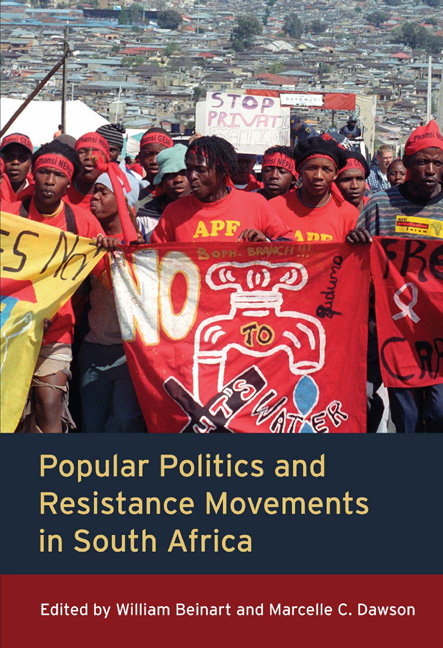Book contents
- Frontmatter
- Contents
- Contributors
- List of Abbreviations and Acronyms
- 1 Popular politics and resistance movements in South Africa, 1970–2008
- 2 The Durban strikes of 1973: Political identities and the management of protest
- 3 ‘There's more to it than slurp and burp’: The Fatti's & Moni's strike and the use of boycotts in mass resistance in Cape Town
- 4 The role of the African National Congress in popular protest during the township uprisings, 1984–1989
- 5 Strategies of struggle: The Nelson Mandela campaign
- 6 From removals to reform: Land struggles in Weenen in KwaZulu-Natal, South Africa
- 7 From popular resistance to populist politics in the Transkei
- 8 ‘It's a beautiful struggle’: Siyayinqoba/Beat it! and the HIV/AIDS treatment struggle on South African television
- 9 The Nelson Mandela Museum and the tyranny of political symbols
- 10 Black nurses’ strikes at Baragwanath Hospital, Soweto, 1948–2007
- 11 The ‘New Struggle’: Resources, networks and the formation of the Treatment Action Campaign (TAC) 1994–1998
- 12 New social movements as civil society: The case of past and present Soweto
- 13 ‘Phansi Privatisation! Phansi!’: The Anti-Privatisation Forum and ideology in social movements
- Endnotes
- Bibliography
- Index
9 - The Nelson Mandela Museum and the tyranny of political symbols
Published online by Cambridge University Press: 21 April 2018
- Frontmatter
- Contents
- Contributors
- List of Abbreviations and Acronyms
- 1 Popular politics and resistance movements in South Africa, 1970–2008
- 2 The Durban strikes of 1973: Political identities and the management of protest
- 3 ‘There's more to it than slurp and burp’: The Fatti's & Moni's strike and the use of boycotts in mass resistance in Cape Town
- 4 The role of the African National Congress in popular protest during the township uprisings, 1984–1989
- 5 Strategies of struggle: The Nelson Mandela campaign
- 6 From removals to reform: Land struggles in Weenen in KwaZulu-Natal, South Africa
- 7 From popular resistance to populist politics in the Transkei
- 8 ‘It's a beautiful struggle’: Siyayinqoba/Beat it! and the HIV/AIDS treatment struggle on South African television
- 9 The Nelson Mandela Museum and the tyranny of political symbols
- 10 Black nurses’ strikes at Baragwanath Hospital, Soweto, 1948–2007
- 11 The ‘New Struggle’: Resources, networks and the formation of the Treatment Action Campaign (TAC) 1994–1998
- 12 New social movements as civil society: The case of past and present Soweto
- 13 ‘Phansi Privatisation! Phansi!’: The Anti-Privatisation Forum and ideology in social movements
- Endnotes
- Bibliography
- Index
Summary
Introduction
Since the dawn of democracy in South Africa in 1994, the government led by the African National Congress (ANC) has used the memory of the liberation struggle in the social construction of space in several of its national development programmes. These include the Reconstruction and Development Programme (RDP), Spatial Development Initiatives, Urban Regeneration Programme and Expanded Public Works Programmes. The use of the struggle memory by the South African government is consistent with global trends whereby public memory forms part of cultural capital for promoting urban development. Many emblematic buildings and projects, characterised by technological feats such as the Guggenheim Bilbao Museum, have been placed at the centre of urban regeneration practices to showcase the design styles of world-renowned architects. This is referred to as ‘hard branding’ and it is used to evoke reactions from citizens and the media.
While hard branding based on the reputations and signature styles of global architects has become a common feature of contemporary cities, South Africa is ‘iconising’ its buildings and projects using the names of its struggle heroes. This process – ‘soft branding’ – involves the use of political and celebrated identities to steer the course of urban development in order to instantiate a particular form of nationhood. Unlike ‘hard branding’, which invests heavily in the physical and material development of space, ‘soft branding’ relies on the symbolic attachment of memory to a particular place. Whereas the former generates popular fanfare out of its aesthetic flare, the latter, as in the case of South Africa and elsewhere, derives recognition from the signification of space through the personalities of individuals, in South Africa's case its struggle heroes.
This chapter focuses on the Mandela Museum project in the township of Alexandra in Johannesburg, which is part of the Presidential Urban Renewal Programme. It looks at the instrumentality of the symbolic politics of Nelson Mandela, whose support campaign is cogently discussed by Klein in this volume. The discussion explores how the ANC government uses the memory of the struggle as the official version of collective memory in the social construction of space in the township. In the process, the chapter draws out the political threads that bring together the various seams of power in the manufacturing of consensus. It also highlights the discordant views among the Alexandra residents affected by the project.
- Type
- Chapter
- Information
- Popular Politics and Resistance Movements in South Africa , pp. 189 - 206Publisher: Wits University PressPrint publication year: 2010



